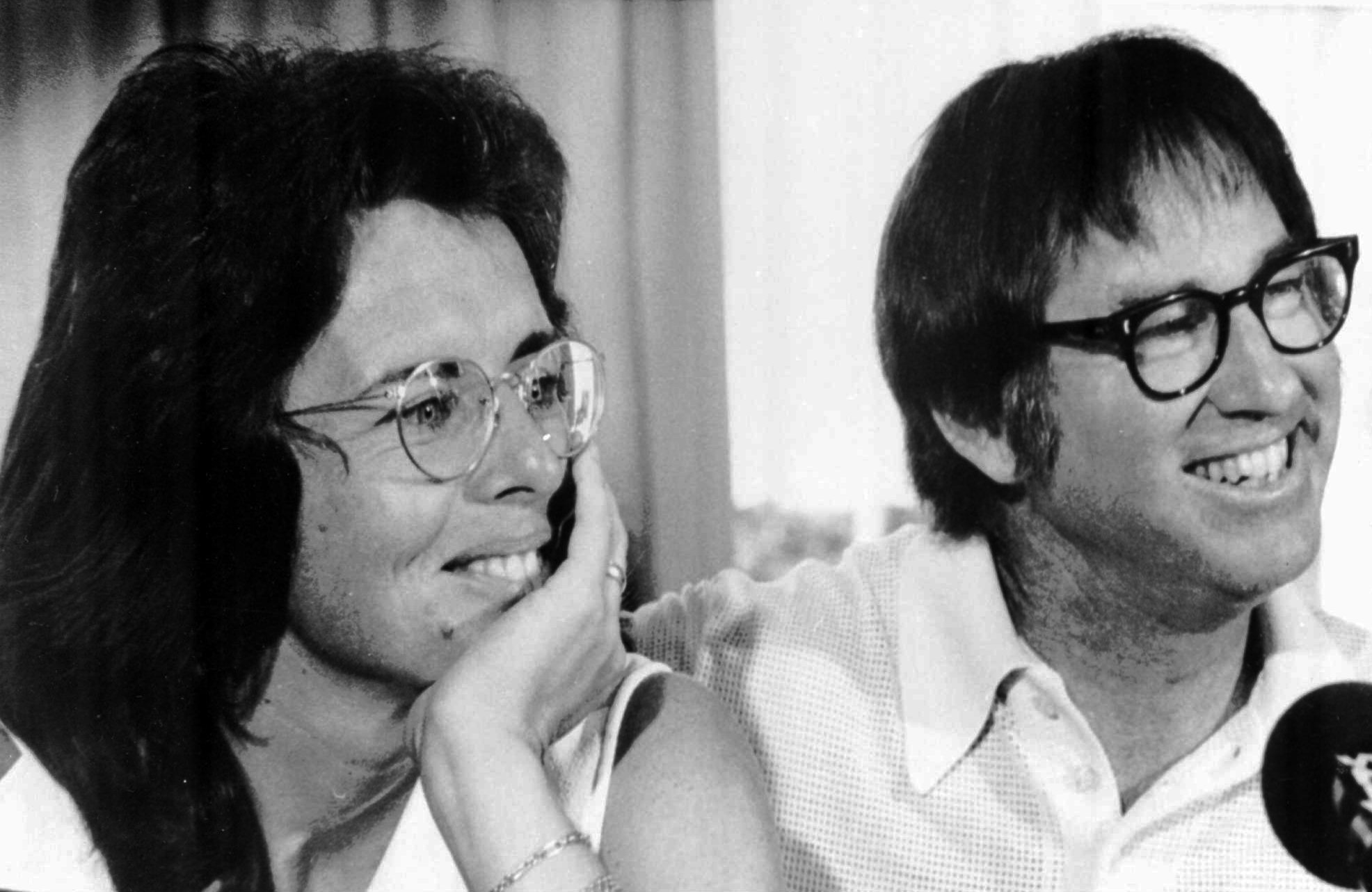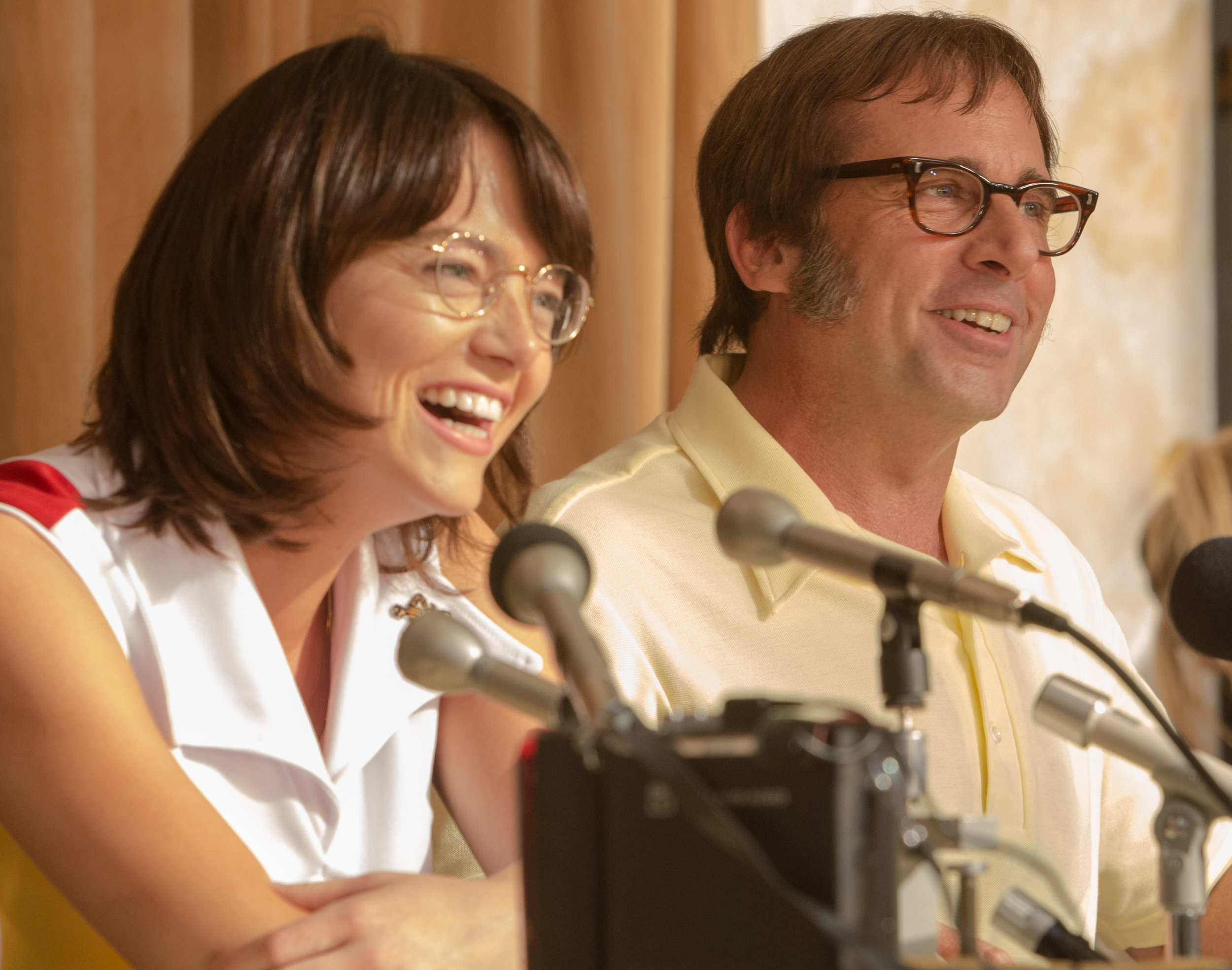Billie Jean King recalls that match, Riggs' death and their mutual accomplishment
By Bonnie Laufer Krebs
If you were alive at the time, you didn’t have to be a tennis fan to be aware of Billie jean King and Bobby Riggs and the Battle Of The Sexes.
Already the top women’s player (and a future hall of famer), King stepped into a perfect storm of hype in 1971 when she agreed to face a middle-aged ex-Wimbledon champ and unabashed “chauvinist pig” named Bobby Riggs in a televised exhibition at a packed Houston Astrodome. The huckster’s challenge became a de facto referendum on the Women’s movement and the very validity of women’s sport.
Billy Jean King and Bobby Riggs back in the day, creating a spectacle
How King turned the tables on Riggs (and maybe saved women’s tennis) is the subject of Battle Of The Sexes. The movie, starring Emma Stone as King and Steve Carell as Riggs, explores King’s efforts - and those of the other women who helped form the Women's Tennis Association - to achieve equal pay for male and female players. And it covers King’s off-court discovery of her sexual identity.
Original-Cin’s Bonnie Laufer Krebs spoke with Billie Jean King in Los Angeles.
ORIGINAL-CIN: It must be quite a roller coaster ride for you to be re-living this time in your life.
KING: “I still am (reliving it) because of doing the promotions for the movie and being around everybody and hearing about it all the time. It is a roller coaster of emotions for me. I can't seem to transport my feelings and clarity about it to be honest.
I feel like back when I was 29 and my emotions were just tumbling around in my soul and my body. I really don't know how to express it. I'm working on a book right now about this time because I can't seem to get a handle on everything.”
Emma Stone and Steve Carell: Reasonable facsimiles thereof
OC: You had to have been thrilled with the casting.
KING: “I'm just so overwhelmed with Emma and Steve Carell and the cast and how well they've done and how authentic this movie is. They've really captured what we went through at the time and I am so thankful for that. The directors (Jonathan Dayton and Valerie Faris) had to approve everyone who was cast and I must say they got it spot on. Seventy five percent of getting the movie right is getting the cast right and they did a marvelous job.”
OC: What impressed you most about Emma Stone, who truly embodies you in the film?
KING: “Oh my goodness. That girl is just wonderful. First of all, we didn't spend too much time together. She decided not to, because she thought that in my 70's I am fully formed and she wanted to make sure she wasn't that part of me. She needed to be how I was at 29. My voice wasn't the same, I was struggling with so many things at the time. So she really did the right thing. We did play a few rounds and I coached her a bit so that she could get some of my tennis moves right.
“Now we are seeing tons of each other because of the press and promotion and we are having a great time.”
OC: She really worked hard, you can see it in her performance.
KING: “She did, because she's not a tennis player. But again, she did the right thing preparing for this role. She had to process the performance the way she had to process it. Just like the way I had to get ready and do my own processing.
“Even for my match with Bobby Riggs, it took two months of visualization and digging deep, really looking at everything around me. I'm a real perfectionist, so much so that I had to know the Astrodome inside and out. I knew the security guards, I knew the pathways, I didn't want to get lost in there or feel the least bit uncomfortable because I only had one match that night. You have to adjust. Being a champion is a privilege, and I really felt that Emma just got all of that right and now it's all reflecting back to me.”
OC: In the film, Riggs comes off as extremely pompous, way over the top. Was he really insufferable?
KING: “Yes, actually, he was [laughs]. But he had so many layers to his character, it was hard to define which Bobby you would see on a given day. He had a lot of turmoil going on in his life off the court as well, and I had my own set of issues that I was dealing with like my sexuality and trying to figure out who I was. I thought Emma did a great job digging in deep and understanding my dilemma at the time.
“After the match, Bobby and I actually became friends. I was with him the night before he died and he said to me, ‘Billie Jean – we really did change things that day, didn't we?’ That meant the world to me knowing what an impact we both made not only on tennis but in so many other ways.”
OC: Now you are a hero to a whole new generation of young women, how does that feel?
KING: “Actually when a woman does something they say we are only helping girls and that's not the way I feel. We are helping everyone because everyone's an influencer. When a girl does something she influences everybody and when a boy does something he influences everybody. So it is important to stress that the things I fought for in 1973 are just as important, if not more so today.”
Battle of the Sexes hits theatres on September 22nd. Read Original Cin's review of the film.


